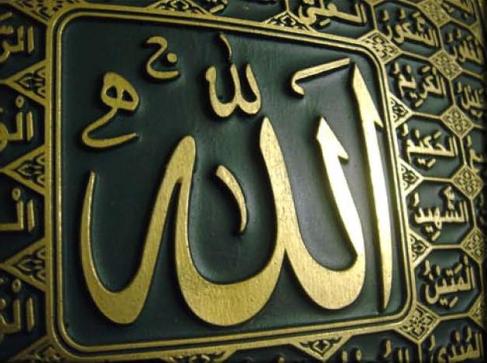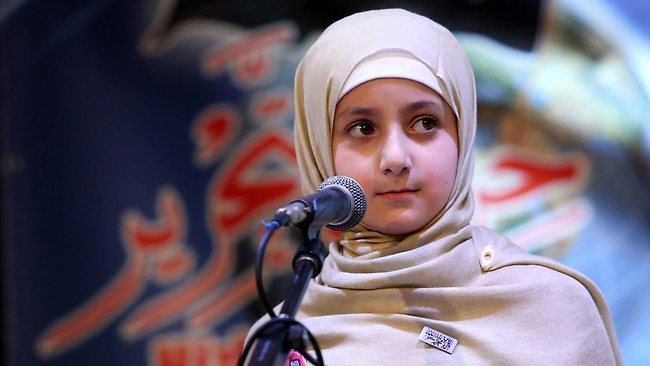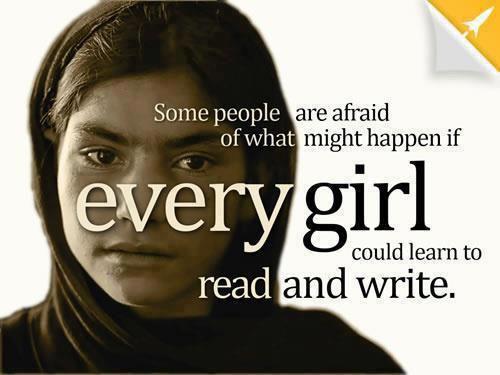Muslim (Book #041, Hadith #6985)
Abu Huraira reported Allah’s Messenger (may peace be upon him) as saying: The last hour would not come unless the Muslims will fight against the Jews and the Muslims would kill them until the Jews would hide themselves behind a stone or a tree and a stone or a tree would say: Muslim, or the servant of Allah, there is a Jew behind me; come and kill him; but the tree gharqad would not say, for it is the tree of the Jews.
A “Heavenly” Marriage!!
Bukhari (Book #93, Hadith #516)
Narrated Anas: zaid bin Haritha came to the Prophet complaining about his wife. The Prophet kept on saying (to him), “Be afraid of Allah and keep your wife.” Aisha said, “If Allah’s Apostle were to conceal anything (of the Quran he would have concealed this Verse.” zainab used to boast before the wives of the Prophet and used to say, “You were given in m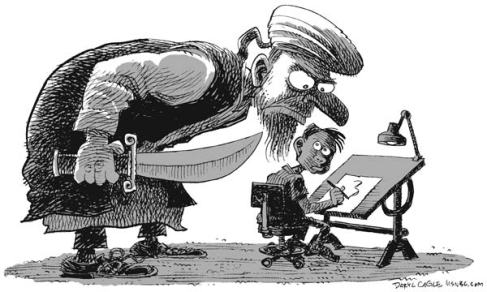 arriage by your families, while I was married (to the Prophet) by Allah from over seven Heavens.” and Thabit recited, “The Verse:– ‘But (O Muhammad) you did hide in your heart that which Allah was about to make manifest, you did fear the people,’ (33.37) was revealed in connection with zainab and zaid bin Haritha.”
arriage by your families, while I was married (to the Prophet) by Allah from over seven Heavens.” and Thabit recited, “The Verse:– ‘But (O Muhammad) you did hide in your heart that which Allah was about to make manifest, you did fear the people,’ (33.37) was revealed in connection with zainab and zaid bin Haritha.”
A YES NO CHECK FOR ISLAM A RELIGION OR PAGAN CULT
- Does the Qur’an define the word “Allah”?- No.
- Was the name “Allah” revealed for the first time in the Qur’an?- No
- Does the Qur’an assume that its readers have already heard of “Allah”?- Yes
- Should we look into pre-Islamic Arabian history to see who “Allah” was before Muhammad?- Yes.
- According to Muslim tradition, was Muhammad born into a Christian family and tribe?- No
- Was he born into a Jewish family or tribe?- No
- What religion was his family and tribe? Pagans
- What was the name of his pagan father? Abdullah (Abd Allah)
- Did Muhammad participate in the pagan ceremonies of Mecca? Yes
- Did the Arabs in pre-Islamic times worship 360 gods?-Yes
- Did the pagans Arabs worship the sun, moon and the stars? Yes
- Did the Arabs built temples to the Moon-god? Yes
- Did different Arab tribes give the Moon-god different names/titles? Yes
- What were some of the names/titles? Sin, Hubul, Ilumquh, Al-ilah.
- Was the title “al-ilah” (the god) used of the Moon-god? Yes
- Was the word “Allah” derived from “al-ilah?” Yes
- Was the pagan “Allah” a high god in a pantheon of deities? Yes.
- Was he worshipped at the Kabah? Yes.
- Was Allah only one of many Meccan gods? Yes
- Did they place a statue of Hubul on top of the Kabah? Yes.
- At that time was Hubul considered the Moon-god? Yes.
- Was the Kabah thus the “house of the Moon-god”? Yes.
- Did the name “Allah” eventually replace that of Hubul as the name of the Moon god? Yes.
- Did they call the Kabah the “house of Allah”? Yes
- Did the pagans develop religious rites in connection with the worship of their gods? Yes.
- Did the pagans practice the Pilgrimage, the Fast of Ramadan, running around the Kabah seven times, kissing the black stone, shaving the head, animal sacrifices, running up and down two hills, throwing stones at the devil, snorting water in and out the nose, praying several times a day toward Mecca, giving alms, Friday prayers, etc.? Yes.
- Did Muhammad command his followers to participate in these pagan ceremonies while the pagans were still in control of Mecca? Yes (Yusuf Ali, fn. 214, pg. 78).
- Did Islam go on to adopt these pagan religious rites? Yes.(Yusuf Ali: fn. 223 pg. 80).
- Were al-Lat, al-Uzza and Manat called “the daughters of Allah”? Yes.
- Did the Qur’an at one point tell Muslims to worship al-Lat, al-Uzza and Manat? Yes. In Surah 53:19-20.
- Have those verses been “abrogated” out of the present Qur’an? Yes.
- What were they called? “The Satanic Verses.” Yes.
- Was the crescent moon an ancient pagan symbol of the Moon-god throughout the ancient world? Yes.
- Was it the religious symbol of the Moon-god in Arabia? Yes
- Were stars also used as pagan symbols of the daughers of Allah? Yes
- Did the Jews or the Christians of Arabia use the crescent moon with several stars next to it as symbols of their faith? No
- Did Islam adopt the pagan crescent moon and stars as it religious symbol? Yes.
- As Islam developed over the centuries, did it adopt pagan names, pagan ceremonies, pagan temples and pagan symbols? Yes
- Is it possible that most Muslims do not know the pagan sources of the symbols and rites of their own religion? Yes.
- Are they shocked to find out the true sources of their ceremonies and stories? Yes
- Can Islam be the religion of Abraham if it is derived from paganism? No
- What then is Islam? A modern version of one of the ancient fertility cults. YES
- Is the “Allah” of the Qur’an, the Christian God of Father, Son, and Holy Spirit? No
- Do the Jews say that the Muslim “Allah” is their God too? NoDid muhamad ran naked with the pagans in kabba? YES
Sahih Bukhari: vol. 5, B. 59, N. 661 says” Narrated Abu Raja Al-Utaridi:”
“We used to worship stones, and when we found a better stone than the first one, we would throw the first one and take the latter, but if we could not get a stone then we would collect some earth (i.e. soil) …and then bring a sheep and milk that sheep over it, and perform the Tawaf around it.
Bukhari V2, B26 #710 (B2 #128)
“Asem told us that he said to Uns bin Malek, a companion of Mohammed, “You were hating to encompass around the Safa and Marwa.” He answered, “Yes, because it was one of the pagan rites of Jahiliyah until Allah gave a verse that the Safa and Marwa are the rites of Allah. If one makes the Hajj to the Kaabah, he must encompass them. The person has no sin when he encompass them.”
How Young German Men Are Lured into Jihad
Young Muslim men in Germany are systematically trying to recruit their peers for jihad using sophisticated rhetoric and psychology and by targeting vulnerable youths who are searching for direction in life. Two men who have quit the scene tell their story to SPIEGEL, providing a rare look into a dangerous underground.
He worked at his uncle’s falafel stand and read Immanuel Kant, and later Plato and Nietzsche. In the end, he became a radical Islamist, recruiting new talent for a Muslim holy war in the middle of the German city of Hamburg. Djamal was the hunter.
Djamal is sitting on a cushion in the dim light of a basement bar in Hamburg. He sucks on a plastic tube, causing the water to bubble in his hookah, a water pipe made of delicate glass decorated with gold paint. His head is shaved, he has the broad back of someone who lifts weights, and he keeps his beard neatly trimmed. He blows the smoke from the orange-mint tobacco into the air above his head and passes the tube to Bora, a quiet young man sitting next to him.
Bora, 23, grew up on the Reeperbahn, a street in Hamburg’s entertainment and red-light district. His parents are from Turkey. His mother sells Tupperware and his father has a store. For a long time, Bora didn’t know what to do with himself. He wanted to have fun, but he was always searching for something meaningful. Then he met radical Islamists. Bora was the prey.
The basement bar where they are now sitting was their common territory for about a year. It was a place where hunters could find their prey.
The bar used to be a hangout for radical leftists called “Hinkelstein.” First-year students would go there to listen to radical leaders, and it was a gateway of sorts on the path to the left-wing extremist milieu.
By the time Djamal had hit upon this basement bar as a place where he could do his work — namely separating his prey from German society — the leftists were long gone. The bar’s new clientele were also looking for answers, but in the Koran instead of in the writings of Marx and Lenin.
‘The Perfect Moment’
The dartboard was replaced with Arabic calligraphy. There are Persian rugs on the floor. The old “Hinkelstein” is now a hookah café, only a few meters away from the Hamburg State Library.
“It’s the perfect place to chill with friends,” says Bora.
“When they’re chilling, it’s the perfect moment to catch them,” says Djamal.
When asked how he did it, Djamal responds: “First you have to catch them. But then they’re like rechargeable batteries: Charge, discharge and recharge.”
Djamal and Bora left the scene 20 months ago. They often ran into each other in this basement bar, even though they never actually met. Although Djamal was a hunter, Bora was never his prey. But the stories the two men relate from that part of their lives, each from his own perspective, offer very precise insights into a world in which German law doesn’t apply. In this world, life on earth is a punishment, a test for the afterlife. Those who move around in it are yearning for the afterlife, not an apprenticeship in an engineering company. This world divides society into the Ummah, or Islamic religious community, and the Kuffar, or infidels. Its denizens don’t even use toothbrushes to brush their teeth, just tooth-cleaning twigs known as miswak.
Reading Kant and Nietzsche
Those who enter this world are continually charged until their batteries are full enough for holy war. The German soldiers of jihad are the most radical members of a youth movement that has German domestic intelligence experts worried.
Djamal arrived in this world three years ago, when he was 19. He was reading Kant and Nietzsche at the time, but he felt frustrated, because they hadn’t written anything that could guide him in a society in which he often felt confused. He had studied their works for months, writing down sentences that appealed to him, hoping that they would help him overcome a difficult time. His father had left his mother and he wasn’t doing well in school, but the philosophers’ clever words were useless.
Djamal kept searching for meaning: at high-school parties, on the Reeperbahn and sometimes in a bottle of vodka.
When his mother married a German convert to Islam, Djamal loaded verses of the Koran onto his iPod. As the son of Lebanese immigrants, it bothered him that a German was more familiar with the Koran than he was. He went to the former “Hinkelstein,” where he smoked hookahs, and where someone eventually invited him into his group. Before long, he had gained access to the inner circle.
A Real Mission
Djamal, who had no idea what to do after finishing high school, had, for the first time in his life, a real mission: recruiting young men for the Hamburg branch of the Islamist organization Hizb ut-Tahrir. The group has been banned in Germany since 2003, but its members are still active underground. They spread Salafist Islam and want to establish a theocracy. Hizb ut-Tahrir’s “catchers” are young, educated and, most of all, articulate. They are people like Djamal.
It was a time when Djamal was looking for “mistakes,” as he called it, in the Bible and the Torah. He memorized verses from the Koran. His only rule was that he had to come across as omniscient. He was determined to prevail over the infidels. At first, he says, sitting on a pillow in the basement bar, his goal wasn’t to spread Islam, but rather to silence the others.
“The Germans have no religious foundation, and yet they like to philosophize,” says Djamal, noting that their most common argument is: “I can’t see God; therefore, he doesn’t exist.” Then Djamal would show up with his talk about Immanuel Kant and his conclusions about the limitations of man. “You just have to be creative. Then you can tell them anything.”
His listeners, young men between 15 and 25, were fascinated, even if they didn’t understand half of what he was saying — but that too was part of the principle. Djamal’s words conveyed the impression of knowledge, direction and meaning.
Part of a Cause
No one instructed Djamal to become a catcher. There are no bosses in this world, no fixed hierarchies. But those who proselytized gained respect within the group. Djamal could feel important, part of a bigger cause and not just a part-time falafel seller in his uncle’s snack bar.
It was a hobby for him at first, says Djamal, a game for which he prepared himself meticulously. He would surf the Internet for weeks, listening to speeches by Pierre Vogel, one of the most important preachers among German Islamists. At the hookah café, Djamal would talk about how women are treated with even less respect in the Bible than in Islam. The Asian tsunami, the Love Parade disaster in 2010 and the crazy shooters going on rampages around the world, he said, were all signs from Allah that the Kuffar were on the wrong path. It was usually very easy, and no one asked any questions.
Sometimes, if his listeners were black, Djamal would follow his talk about God by mentioning Malcolm X, the US civil rights activist and idol who was also a Muslim. References to Malcolm X were always effective.
As a rule, Djamal and the other catchers met boys like Bora. For Djamal, boys like Bora fell into the category of “easy prey.”
‘Come and Sit with Us, Brother’
Bora liked to go to Turkish parties and enjoy himself on the Reeperbahn, but the hookah café was his favorite place. There were no bouncers there who would refuse to let him in because his skin was too dark or his shoulders too wide from Thai boxing. Bora and his friends also referred to the café as their “cave.” When they were there, they played computer games like “Fifa” and “Counter Strike” on the PlayStation, which was connected to the flat-screen monitors. In the evenings, they would rent movies like “Avatar” and “Kickboxer” from the video store and drink vodka they had brought along.
Every evening, when the bar filled up, Djamal began his shift. Bora clearly remembers the day when Djamal’s friends showed up. It was in January 2010. They were wearing Adidas jackets and New York Yankees baseball caps, G-Star pants and Nike Air Max shoes. They looked like him, but Bora quickly noticed that there was something different about them.
They were quiet and peaceful, and they treated each other like brothers. While his friends talked about women, sports cars and soccer, the new guys discussed the meaning of life and the existence of God. They used terms like the Big Bang and the theory of evolution. Bora couldn’t stop listening to them.
“Why don’t you come and sit with us, brother?” one of the new ones asked. He was part of a group of five men between 18 and 30. For Bora, it seemed perfectly normal to be meeting these men, but for the others it was a well-practiced procedure.
Targeting Santa Claus Muslims
“Our strategy was always the same,” says Djamal: sit down, start talking about God, take a look around to see if anyone seems interested, and invite “the brother” to join the group. Then a process began that Djamal and his fellow proselytizers had worked out in role-playing games in a motel room in an industrial part of Hamburg. In the exercises, one person was always the “victim,” or infidel, while the others would try to “catch” him. A person is considered caught when he believes in the existence of God and starts to become interested in Islam.
Bora, the “easy prey,” is part of a generation of young children of immigrants who were born in German cities and grew up there. Their parents have raised them in traditional Islamic ways, but the children tend to work out their own version of Islam. Pierre Vogel calls them “Santa Claus Muslims.” They know that pork is forbidden for Muslims, but they’ve tried it anyway, perhaps at their first soccer match. They know that drinking alcohol is a sin for Muslims, as is sex before marriage, and yet they party every weekend.
They only go to the mosque on holidays, and when they do they awkwardly imitate their elders, because they don’t know how to pray. Boys like Bora always have a guilty conscience, because they sense that they are not sufficiently serious in fulfilling their religious obligations.
“But they believe in God, so the rest is easy,” says Djamal.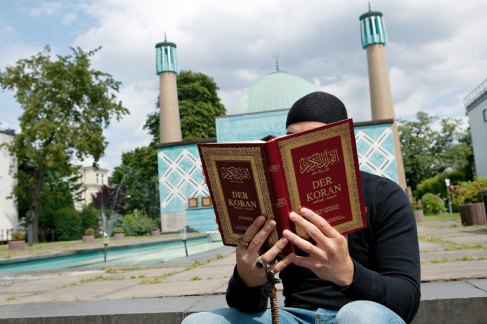
AS Julia Gillard struggled to explain how Muslim children could be used to incite violence, eight-year-old Ruqaya yesterday fronted a congress of Islamic Fundamendalists in Sydney to espouse her love for jihad. Addressing a 600-strong crowd at the Australian chapter of Hizb ut-Tahrir in Bankstown in the city’s west, the young girl urged all Muslim youth to fight for the restoration of the Islamic caliphate, a single global government for all Muslims established under strict sharia law.
“My dear brothers and sisters in Islam, as the world gathers against the believers in Syria … seeking to hijack our sincere and blessed uprisings, children in Sydney would like to send their message of hope and support to the Muslims of (Syria), especially to the children and mothers,” she read from notes. “These uprisings have demonstrated that this umma (global Muslim community) is alive and well, her love is for jihad, she is unshackled herself from the fear which she held, and she yearns to once again live under the banner of (the Islamic state).
“Children as young as myself can be seen on the streets joining the uprisings, risking their lives to bring food, water and medicine to their wounded family members, some of them never returning to their mothers … Nobody is too young,” she said.
Organisers of the event invited the media to report on her address.
Julia Gillard yesterday expressed her horror at images showing Muslim children carrying inflammatory placards at a protest in Sydney on Saturday, including one that read “Behead all those who insult the Prophet”.
Another sign at the protest read “Our dead are in paradise, your dead are in hell”.
“I do not want to see in the hands of anyone, particularly children, offensive signs that call for the killing of others,” the Prime Minister said.
“This is not the Australian way.
“We believe in freedom of religion and we believe that every religion should be treated with respect.”
Hizb ut-Tahrir is an international political movement devoted to restoring a caliphate, the last of which collapsed in the 1920s.
The movement hopes Islamic fighters in Syria will replace the Assad regime with a caliph-led state that will eventually annex other Muslim countries and promote Islam in the West.
The caliphate would also threaten Western nations with jihad if they did not prevent their citizens from defaming the Prophet Mohammed or Islam.
It would be established under the same constitution imposed under Mohammed, which could not be reformed.
Ruqaya said: “We must work hard to achieve victory. It is enough that your generation and your parents’ generation were raised in the absence of the khilafa (caliphate). Do not allow my generation to be added to that list.”
Khaled Sukkarieh, the chairman of the Islamic Council of NSW, said images of children at the protest shocked many in his community. “Someone put that (banner) in the hand of a child.
“That is a poor, innocent child. It is abhorrent and a very sad way of using children,” Mr Sukkarieh said.
Islam is no longer religion of peace
- Why do people find Muslims as terrorists?
- Do they posses terror acts in any way?
- Where can we see a secular Muslim person?
The answer is very simple. Any person who believes in Islamic Doctrine he himself is a terrorist.
Want more evidence, then read below.
when your Lord inspired to the angels, “I am with you, so strengthen those who have believed. I will cast terror into the hearts of those who disbelieved, so strike [them] upon the necks and strike from them every fingertip.”Sura 8:12
O you who have believed, do not take the Jews and the Christians as allies. They are [in fact] allies of one another. And whoever is an ally to them among you – then indeed, he is [one] of them. Indeed, Allah guides not the wrongdoing people. Sura 5:51

